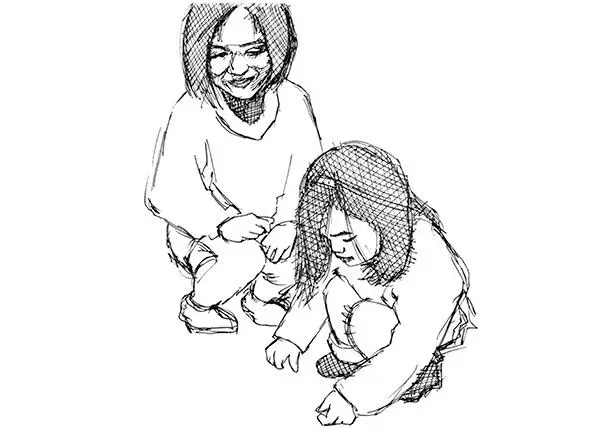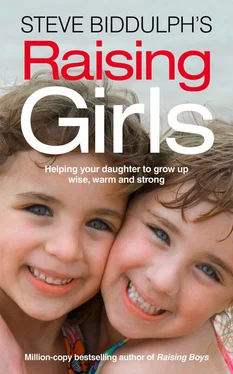The difference increases in the first five or six years. Girls learn to speak whole sentences and control their fingers, to do neat drawings or even writing, six to twelve months sooner than boys. Girls are ready to start school about a year earlier than boys. Girls do not suffer as much separation anxiety as boys if they have to go to childcare – although this varies a lot with the individual child.

Girls enter puberty about two years sooner than boys do, turning into young women overnight when the boys seem to be standing still. And finally, they become adult sooner – girls’ brain development finishes several years before boys finally get there in their early twenties! It’s as if Nature says to girls: you’d better grow up ahead of the game, you will need your wits about you!
If you are a mother, you have a huge advantage in raising a daughter – you used to be one . If you are a dad, it’s different, but daughters don’t expect their dads to be their mums, usually, so it’s all right, you have a different part to play that is just as important.
If you’re a mum reading this, think back to your own childhood. (It’s still worth doing this if you’re a dad, though the stages would have been somewhat different …)
Did you feel safe and secure when you were a baby? Were your parents in a good place in their lives and able to really love and enjoy you?
Were you encouraged to play, enjoy and explore the world around you? Did your parents have the time and interest to excite you and show you how good life was as a toddler?
When you went to school, did your parents help you and show you how to get along with others? Could they get along with others themselves? Could they look out for themselves but also respect the needs of others?
Did you find in your early teens that your unique interests were supported, or were people too busy?
Did you find in your mid-teens that you could get to know your own soul and connection to Nature and the universe, and be strengthened in this?
And finally, in your late teens, did you have a clear transition to being adult, where you felt that you took control of your own life, faced the consequences of your actions, and had a sense of power as well as a purpose?
Lots of questions, but you will quickly work out where you did okay and where things fell down. Perhaps that will help you know how to get it right for your daughter, and how important that is.
You use the stages by asking, what age is our girl? What is the most likely big question that her life is asking, according to the stages listed above? (Always check with your own experience, rather than letting books or theories dictate your actions.) If your gut feeling is that this IS the stage she is in, you can organise the experiences and inputs to help her along. We will teach you how in the chapters to come.
Another use of the stages is ‘remedial’; you can pinpoint the earlier stages that she might have missed out on, due to difficult circumstances. The nature of human beings is that we can often recover things that we missed out on, by getting them down the track. For example, adopted children from terrible backgrounds can gradually find security with their new parents. Overprotected girls who are fearful can be challenged and coaxed to show more courage. Girls with no people skills can learn to get along better, and so on. Be open to the possibility that your daughter may be a certain age in years, and a far younger age in development, if she missed out due to life circumstance during the earlier parts of her ‘quest’.
Gemma, aged ten, is very clingy and always needs cuddles and closeness from her mum.
At first, her mum finds this annoying, but then she remembers something – that she was very stressed and suffered depression when Gemma was a baby. She realises that Gemma, though really in Stage 3, is going back to complete her Stage 1 ‘Am I loved and safe?’ She decides to really give Gemma all the hugs that she seems to need, and finds that it makes a huge difference. Her daughter relaxes more and becomes much more confident and independent within a couple of months.
UNDER STRESS, WE ALL REGRESS!
Here’s a handy tip. Sometimes when a family is under stress, kids will deal with this by dropping back a stage . A confident five-year-old will suddenly suck her thumb and want to wrap herself up in a blanket. A 14-year-old would rather hang out with you at a party or barbecue than mix with the other kids. Or a 21-year-old will refuse to make a decision for herself and want to be told what to do.
Under stress, we all drop back a stage or two – think of those times when you just don’t want to get out of bed, or just don’t want to deal with people. That’s quite normal from time to time. Generally, let your daughter regenerate and recuperate in this way – nobody can handle reality all of the time. You only need to worry if she doesn’t seem to ‘grow up’ after a few days. She might need nudging out of it, or some more help to find out what is wrong.
Be sure you find out the reason why she is stressed, if there is no obvious explanation. There may be something she needs to tell you that she is finding hard to talk about.
Be gentle on yourself, too, so she can see that everyone needs nurture and to slow down. Lowering your whole family’s stress levels with holidays, having one day of the week as a rest day, and less overscheduling generally, means that she won’t be as likely to go into overload. Often a stressed child is an indicator that the whole family needs to slow down.
All girls go through five stages to become a woman.
These stages teach her the five big lessons of growing up: being secure, learning to explore, relating to other people, finding your soul, and taking charge of your life. Adult help is needed for all of these, and the adults have to know what to do.
Parents who know the map of girlhood can organise their lives to provide what is needed.
It’s your daughter who makes the journey, but you are her coaches, caregivers and allies along the way. Taking on these roles is probably the best thing you will ever do.
Chapter 2
Right from the Start
(Birth–2 years)
It’s early morning and little Lucy, just five weeks old, is lying wide awake in her cot beside her parents’ bed. Her mum and dad are both asleep, in fact her dad is lightly snoring. Lucy watches the dancing shadows made by the sunlight on the wall. From time to time, she waves her arms in sheer delight. She makes happy noises, and her head turns from side to side as she takes in the wonder of the world.
After a while, Lucy starts to feel hungry. She whimpers, and her mother, ears attuned for her baby’s sounds by a million years of mammalian history, wakes up, even though her husband’s snoring has not disturbed her all night. She reaches over and sleepily brings Lucy into the bed, then unbuttons a milk-swollen breast for her to suckle on. Lucy hasn’t needed to get upset, so she settles happily to feed, fully alert, looking into her mum’s eyes as she does so. At this age the focal length of her eyes is fixed at just the right distance to her mother’s face when feeding, about 30 centimetres, anything further away is still blurred. All she needs to see clearly is that her mum is happy and content. Then she can relax too.
Читать дальше













